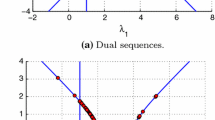Abstract
It has been previously demonstrated that in the case when a Lagrange multiplier associated to a given solution is not unique, Newton iterations [e.g., those of sequential quadratic programming (SQP)] have a tendency to converge to special multipliers, called critical multipliers (when such critical multipliers exist). This fact is of importance because critical multipliers violate the second-order sufficient optimality conditions, and this was shown to be the reason for slow convergence typically observed for problems with degenerate constraints (convergence to noncritical multipliers results in superlinear rate despite degeneracy). Some theoretical and numerical validation of this phenomenon can be found in Izmailov and Solodov (Comput Optim Appl 42:231–264, 2009; Math Program 117:271–304, 2009). However, previous studies concerned the basic forms of Newton iterations. The question remained whether the attraction phenomenon still persists for relevant modifications, as well as in professional implementations. In this paper, we answer this question in the affirmative by presenting numerical results for the well known MINOS and SNOPT software packages applied to a collection of degenerate problems. We also extend previous theoretical considerations to the linearly constrained Lagrangian methods and to the quasi-Newton SQP, on which MINOS and SNOPT are based. Experiments also show that in the stabilized version of SQP the attraction phenomenon still exists but appears less persistent.
Similar content being viewed by others
References
Bonnans J.F., Gilbert J.Ch., Lemaréchal C., Sagastizábal C.: Numerical Optimization: Theoretical and Practical Aspects, 2nd edn. Springer, Berlin (2006)
Fernández, D., Solodov, M.: Stabilized sequential quadratic programming for optimization and a stabilized Newton-type method for variational problems. Math. Program. doi:10.1007/s10107-008-0255-4
Fischer A.: Modified Wilson’s method for nonlinear programs with nonunique multipliers. Math. Oper. Res. 24, 699–727 (1999)
Fischer A.: Local behavior of an iterative framework for generalized equations with nonisolated solutions. Math. Program. 94, 91–124 (2002)
Friedlander M.P., Saunders M.A.: A globally convergent linearly constrained Lagrangian method for nonlinear optimization. SIAM J. Optim. 15, 863–897 (2005)
Gill P.E., Murray W., Saunders M.A.: SNOPT: an SQP algorithm for large-scale constrained optimization. SIAM J. Optim. 12, 979–1006 (2002)
Golubitsky M., Schaeffer D.G.: Singularities and Groups in Bifurcation Theory, vol. 1. Springer, New York (1985)
Hager W.W.: Stabilized sequential quadratic programming. Comput. Optim. Appl. 12, 253–273 (1999)
Izmailov A.F., Solodov M.V.: Karush-Kuhn-Tucker systems: regularity conditions, error bounds and a class of Newton-type methods. Math. Program. 95, 631–650 (2003)
Izmailov A.F., Solodov M.V.: Examples of dual behaviour of Newton-type methods on optimization problems with degenerate constraints. Comput. Optim. Appl. 42, 231–264 (2009)
Izmailov A.F., Solodov M.V.: On attraction of Newton-type iterates to multipliers violating second-order sufficiency conditions. Math. Program. 117, 271–304 (2009)
Izmailov, A.F., Tretyakov, A.A.: 2-Regular Solutions of Nonlinear Problems. Theory and Numerical Methods. Fizmatlit, Moscow (1999) (in Russian)
Murtagh B.A., Saunders M.A.: A projected Lagrangian algorithm and its implementation for sparse nonlinear constraints. Math. Program. Study 16, 84–117 (1982)
Murtagh, B.A., Saunders, M.A.: MINOS 5.0 user’s guide. Technical Report SOL 83.20, Stanford University, December (1983)
Nocedal J., Wright S.J.: Numerical Optimization. Springer, New York (1999)
Pang J.-S.: Error bounds in mathematical programming. Math. Program. 79, 299–332 (1997)
Robinson S.M.: A quadratically convergent algorithm for general nonlinear programming problems. Math. Program. 3, 145–156 (1972)
Wright S.J.: Modifying SQP for degenerate problems. SIAM J. Optim. 13, 470–497 (2002)
Wright S.J.: Superlinear convergence of a stabilized SQP method to a degenerate solution. Comput. Optim. Appl. 11, 253–275 (1998)
Author information
Authors and Affiliations
Corresponding author
Additional information
The research of A. F. Izmailov is supported by the Russian Foundation for Basic Research Grants 07-01-00270, 07-01-00416 and 09-01-90001-Bel, and by RF President’s Grant NS-693.2008.1 for the support of leading scientific schools. M. V. Solodov is supported in part by CNPq Grants 301508/2005-4 and 471267/2007-4, by PRONEX–Optimization, and by FAPERJ.
Rights and permissions
About this article
Cite this article
Izmailov, A.F., Solodov, M.V. On attraction of linearly constrained Lagrangian methods and of stabilized and quasi-Newton SQP methods to critical multipliers. Math. Program. 126, 231–257 (2011). https://doi.org/10.1007/s10107-009-0279-4
Received:
Accepted:
Published:
Issue Date:
DOI: https://doi.org/10.1007/s10107-009-0279-4




